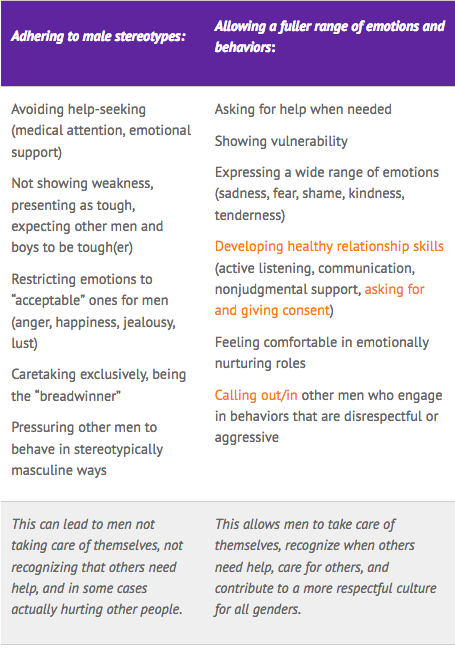Healthy Masculinity
< < Go Back
Princeton’s new ‘men’s engagement manager’ to combat aggressive masculinity on campus
You’ve probably heard expressions like “man up” or “real men don’t cry.” While the concept of gender is often associated with women, statements like these reflect gendered expectations for men too. Think about a term like guy code: it refers to the unspoken rules that men are “supposed” to follow.
How do men learn the rules? Starting from childhood, boys and men are often called out for behavior that doesn’t match society’s definition of manhood. It might take the form of name calling (“sissy,” “punk,” “wuss”), being told that they’re gay or “throw like a girl,” or aggression against them such as hitting, bullying, or even sexual assault.
This forces men to make a choice. Either:
1. Go along with stereotypical male roles, even if they personally don’t agree with them; or
2. Push back against the rules and feel like they’re “going against the grain.”
Actually, research shows that MOST men don’t personally agree with “real men” stereotypes. Unfortunately, many go along with the expected attitudes and behaviors because they think most other men endorse them. What that means is that most men actually support a fuller range of human emotions and behaviors.
There are many positive qualities that have historically been defined as either masculine (leadership, strength, courage) or feminine (nurturing, compassion, caring). In reality, people are individuals with a unique combination of attributes. By getting rid of the rules about who can have what qualities, people of all genders can be respected for who they are.
How to encourage men to be their true selves, instead of being confined to stereotypes:
Address disrespect by calling people in/out
Allow men to express a wide range of emotions
Encourage men to demonstrate nurturing, compassion, and caring behavior toward themselves and others
Create openings for men to share their experiences and feelings, especially if you sense there’s a problem
If you see a man hurting, check in with him
If you’re a man, ask for help when you are struggling
Join the Men’s Allied Voices for a Respectful and Inclusive Community (MAVRIC) Project (link is external), a group here at Princeton committed to promoting healthy masculinity.
There are many different ways to be a man. Acknowledging this provides an opportunity for everyone (all genders) to be respected for who they are and, in turn, give respect to others.
More From Princeton University – U Matter:





